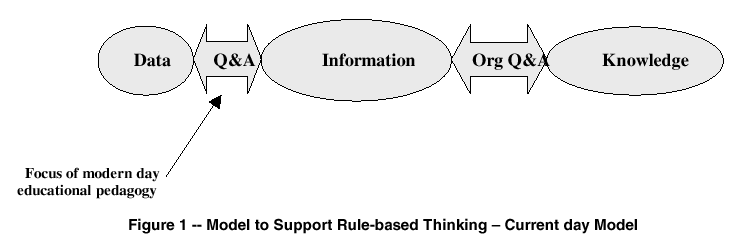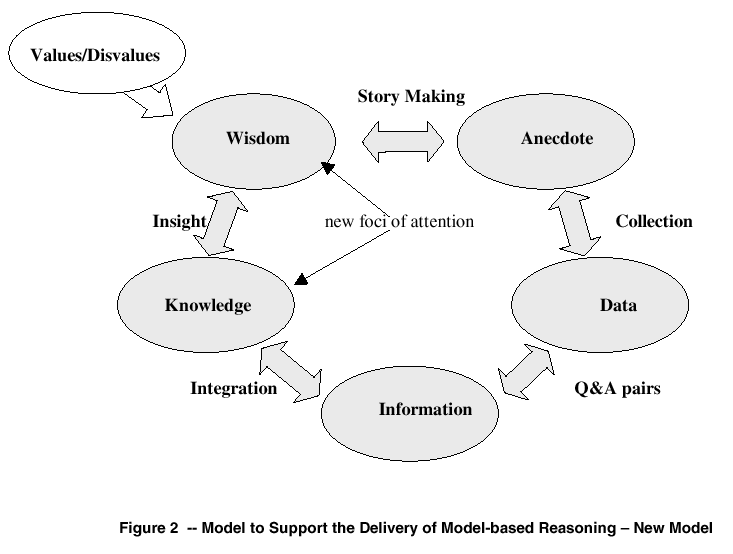 Teacher Feature...
Teacher Feature...
What Are We Aiming At--What Do We Really Want To Aim At?
by Rob Reilly Ed.D.
Introduction
The education establishment, including most of its research community, remains committed to the educational philosophy of the late nineteenth and early twentieth centuries, and so far none of those who challenge these hallowed traditions has been able to loosen the hold the educational establishment has on how children are taught.
- Seymour Papert, The Children's Machine
Current day education involves the delivery of 'answers' far more than it involves the learning of 'answers'--the discovery of 'answers'--the trial and error learning of the process of finding 'answers' (and the generation of new 'questions'). Traditionally educational pedagogy emphasizes conveying a lot of information and facts, and does not model the learning process. When teachers present material to the class, it is usually in a polished form. Current day educational pedagogy omits the natural steps of making mistakes (feeling confused), recovering from them (overcoming frustration), deconstructing what went wrong (not becoming dispirited), and starting over again (with hope and maybe even enthusiasm). Also, learning naturally involves failure and a host of associated affective responses. However current day educational pedagogy lacks these natural components.
But refocusing and then reengineering educational pedagogy is a non-trivial task. To justify any change, it must be shown that past research or legacy research is obsolete or irrelevant. To make our point we need to briefly review the nature and purpose of education over the years.
In Colonial days, schools were based upon "recitation literacy" and from the World War I era forward schools were based upon "extraction literacy" [Wolf, 1988]. However a major shift in intellectual abilities has necessitated the need for students of the new millennium to understand the state of their knowledge, be able to build upon it, improve it, and apply it appropriately. In short today's "[s]ociety envisions graduates of school systems who can identify and solve problems and make contributions to society through their lifetime--who display the qualities of 'adaptive expertise'" [Bransford, 1999; also see Talbert and McLaughlin, 1993]. Thus contemporary thought views learning as a person's ability to construct new knowledge based upon what they already know or believe to be true (e.g., Cobb, 1994; Piaget 1952, 1973a, b, 1977, 1978; Vygotsky 1962, 1978); in short, the ability to perform model-based reasoning based upon reflection (actually 'recursion'), and metacognition. This is where we need to be in regard to educational pedagogy.
But schools seem to be functioning on the same old path--following the timeworn trails of our predecessors. However the challenges and expectations have dramatically changed [e.g., Bruer, 1995; Resnick, 1987]. Realizing that this education shift is happening/needed is critical when redesigning the delivery of education to a learner. These new goals (new foci) require changes in learning environments.
However current learning theory "does not provide a simple recipe for designing effective learning environments" given the needed depth of change [Bransford, 1999]. "New developments in the science of learning raise important questions about the designs of learning environments...[the] general characteristics of [those] learning environments... [and creates a need to examine] new developments in the science of learning" [Bransford, 1999].
The basis of a model that will serve as a foundation for educational pedagogy should be embodied from such a mind-set (developing model-based thinkers). Educators should recognize and understand the affective and cognitive state of the learner and respond in an appropriate manner (e.g., adjust the pace, direction, complexity of learning). But they must do so with educational pedagogy that aims at the correct target--that being the acquisition of information and an understanding of how to apply it.
First we should review the traditional model of learning (shown in Figure 1) and then evolve a new model (shown in Figure 2) that flows from the traditional one.
 (click the image for a larger view)
(click the image for a larger view)
What is data? Data is the answer to an unasked question. Information, on the other hand, is the answer to an asked question. So to get from Data to Information, one must find Question-Answer Pairs that link each Anecdote or Datum to a corresponding Question. Information (Question-Answer Pairs) are like the pieces of an unassembled Jigsaw Puzzle. Knowledge is like an assembled jigsaw puzzle. The Question-Answer pairs are organized into a structure, in the logical order in which new questions arise. The structuring methodology is largely due to Socrates. See http://www.musenet.org/utnebury/socratic.txt for a possible template.
Knowledge (an assembled jigsaw puzzle) reveals a previously hidden Big Picture. Seeing this Big Picture is called Insight. The Jigsaw Puzzle of Knowledge is like a Tapestry into which is woven many otherwise hidden and previously unrevealed stories.
Wisdom is the ability to see and extract the stories woven into the Tapestry of Knowledge. So from Wisdom we get the Art of Story Making. The ancients crafted Myths, which were the prototypical stories of their cultures. A Story is an Anecdotal Model drawn from the culture.
'Insight' is seeing the picture as revealed by the assembled 'jigsaw puzzle of knowledge.' To get from knowledge to wisdom one must fold in a Values Systems (one's moral compass), which ties into purposes and desires.
 (click the image for a larger view)
(click the image for a larger view)
And in Conclusion
Why is there no word in English for the art of learning? Webster says that pedagogy means the art of teaching. What is missing is the parallel word for learning. In schools of education, courses on the art of teaching are simply listed as "methods." Everyone understands that the methods of importance in education are those of teaching--these courses supply what is thought to be needed to become a skilled teacher. But what about methods of learning?
- Seymour Papert, The Children's Machine
We stand at the gates of an opportunity that seldom presents itself. This opportunity is to do great things for large numbers of people--to change education itself. We can not only refocus education, but we can invent it, we can facilitate its effective implementation into schools, we can impact the children who will soon be the adults of the 21st century by providing them an education that will prepare them to 'learn how to learn,' which is an essential skill and will enable these adults to compete in the world economy.
Acknowledgement
This material is based upon work supported by the National Science Foundation under Grant No. 0087768. Any opinions, findings, or conclusions or recommendations expressed in this material are those of the author(s) and does not necessarily reflect the views of the National Science Foundation.
References
Bansford, John, Ann L. Brown, and Rodney Cocking (Eds.) (1999). How People Learn: Brain, Mind, Experience, and School. Washington DC: National Academy Press.
Bruer, J.T. (1993). Schools for Thought. Cambridge, Mass.: MIT Press.
Cobb, B. (1994). "Theories of Mathematical Learning and Constructivism: A Personal View." Paper presented at the Symposium on Trends and Perspectives in Mathematics Education, Institute for Mathematics, University of Klagenfurt, Austria.
Papert, Seymour (1993). The Children's Machine: Rethinking School in the Age of the Computer, Basic Books: New York.
Piaget, J. (1952). The Origins of Intelligence in Children. M. Cook translator. New York: International Universities Press.
Piaget, J. (1973a). The Child and Reality: Problems of Genetic Psychology. New York: Grossman.
Piaget, J. (1973b). The Language and Thought of the Child. London: Routledge and Kegan, Paul.
Piaget, J. (1977). The Grasp of Consciousness. London: Routledge and Kegan Paul.
Piaget, J. (1978). Success and Understanding. Cambridge, Mass.: Harvard University Press.
Resnick, L.B. (1987). Education and Learning to Think. Washington DC: National Academy Press.
Talbert, J.E. and M.W. McLaughlin. (1993). "Understanding Teaching in Context," Teaching for Understanding: Challenges for Policy and Practice, D.K. Cohen, M.W. McLaughlin and J.E. Talbert (Eds.), San Francisco: Jossey-Bass.
Vygotsky, L.S. (1978). Mind and Society: The Development of Higher Psychological Processes. Cambridge, Mass.: Harvard University Press.
Wolf, D.P. (1988). "Becoming Literate," Academic Connections: The College Board 1(4).
| 
